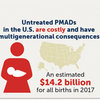0
Research
Community:
May 25, 2023
We all want to live in a community where everyone has access to safe drinking water, green parks, and a reliable transit system. Strong infrastructure is key to ensuring communities have access to these necessities.
But this is not everyone’s reality today. For decades, barriers like residential segregation have fueled a lack of investment and inadequate and failing infrastructure in places where Black, Latino, and Indigenous people live today. These inequities create barriers to good health.
Investing in infrastructure—the building blocks of our communities—can transform communities so they are healthier and more equitable places to live.
Authored by: Robert Wood Johnson Foundation
Topics: Environmental Resiliency/Climate Change, Green, Health, Racial inequalities, Research, Transportation
 Shared by Sandra Ware
Shared by Sandra Ware
Sandra Ware posted a
on May 25, 2023
Robert Wood Johnson Foundation
We all want to live in a community where everyone has access to safe drinking water, green parks, and a reliable transit system. Strong infrastructure is key to ensuring communities have access to these necessities.
But this is not everyone’s reality today.
0
Research
Community:
Jan 27, 2023
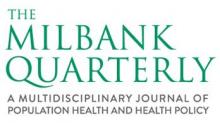
Poor maternal and child health (MCH) outcomes and rates of chronic disease are persistently high in the United States and concentrated in rural and service-deprived areas where local health departments provide most care. In a new Milbank Quarterly study, Taryn A. G. Quinlan, Amelia L. Mitchell, and Glen P. Mays of the Colorado School of Public Health use national survey data from 630 local health departments to understand the relationship between social service collaboration and the provision of direct MCH services, such as the Special Supplemental Nutrition Program for Women, Infants, and Children (WIC).
The authors found local health departments that directly offer MCH services were more likely to collaborate with community partners that provide social services. Still, more than half of these departments were considered low collaborators.
“By working together to address MCH disparities, health and social service organizations could pool resources to provide needed services and identify innovative solutions to address disparities in their communities, thereby increasing system capacity to achieve equitable health outcomes,” the authors say.
Authored by: Taryn A.G. Quinlan, Amelia L. Mitchell, Glen P. Mays for The Milbank Quarterly
Topics: dual-generation initiative, Early childhood, Health, Low-income, Partnerships, Research
 Shared by Sandra Ware
Shared by Sandra Ware
Sandra Ware posted a
on Feb 7, 2023
Taryn A.G. Quinlan, Amelia L. Mitchell, Glen P. Mays for The Milbank Quarterly
Poor maternal and child health (MCH) outcomes and rates of chronic disease are persistently high in the United States and concentrated in rural and service-deprived areas where local health departments provide most care. In a new Milbank Quarterly study, Taryn A. G. Quinlan, Amelia L.
0
Research
Community:
Jul 19, 2022
This ebook, authored by Next City, explores ways that creative placemaking can expand opportunities for low-income people living in disinvested communities.
The journalism Next City has produced for the series “For Whom, By Whom” chronicles how creative placemaking can expand opportunities for low-income people living in disinvested communities. These stories give lie to the false narrative that such neighborhoods are home to violence and deprivation instead of talent, imagination, and solutions. Here are communities that produce incredible feats despite being terminally under-resourced, and despite systemic neglect that has persisted for generations.
Authored by:
Topics: Community development, Mobility, Place-based, Racial inequalities, Research
 Shared by Malcolm Guy
Shared by Malcolm Guy
Malcolm Guy posted a
on Jul 19, 2022
This ebook, authored by Next City, explores ways that creative placemaking can expand opportunities for low-income people living in disinvested communities.
The journalism Next City has produced for the series “For Whom, By Whom” chronicles how creative placemaking can expand opportunities for lo
0
Video
Community:
Jun 17, 2022
The Vancouver Housing Authority collaborated with a Federally Qualified Health Center and a homeless crisis response system to develop a network of scattered-site and site-based supportive housing. This moderated discussion will cover how VHA paired Housing Choice Vouchers and public housing with a Medicaid-funded supportive housing benefit to serve people identified by the community’s Coordinated Entry as needing supportive housing. Speakers will also discuss the challenges faced through the process, model adjustments made, and evaluation of the work through matching housing data and Medicaid utilization data.
Authored by:
Topics: Advocacy, CLPHA, Data sharing, Family engagement, Health, Healthy homes, Homelessness, Housing, Legislation & Policy, Low-income, Research, Stability, Sustainability
 Shared by Karina George
Shared by Karina George
Karina George posted a
on Jun 17, 2022
The Vancouver Housing Authority collaborated with a Federally Qualified Health Center and a homeless crisis response system to develop a network of scattered-site and site-based supportive housing.
0
Video
Community:
Jun 17, 2022
The Columbus Metropolitan Housing Authority (CMHA) has formed a partnership with the Healthcare Collaborative of Greater Columbus (HCGC) and their Central Ohio Pathways HUB to provide supportive services to all 14,000 CMHA-assisted households. HCGC’s HUB is a nationally certified program focused on addressing the Social Determinants of Health in an effort to improve health outcomes for at-risk populations. The HUB oversees 10 Care Coordination Agencies (CCAs) and their employed Community Health Workers (CHWs) to provide these services. The HUB contracts with Medicaid Managed Care Organizations, who provide payments to the HUB for services called Pathways delivered to their members.
Authored by:
Topics: Advocacy, Community development, Housing, Partnerships, Racial inequalities, Research, Supportive housing, Sustainability
 Shared by Karina George
Shared by Karina George
Karina George posted a
on Jun 17, 2022
The Columbus Metropolitan Housing Authority (CMHA) has formed a partnership with the Healthcare Collaborative of Greater Columbus (HCGC) and their Central Ohio Pathways HUB to provide supportive services to all 14,000 CMHA-assisted households.
0
Video
Community:
Jun 17, 2022
The Administration for Community Living’s Aging and Disability Network is a multifaceted service infrastructure for older adults and people with disabilities so they can find housing and obtain services like chore assistance, delivered meals, and transportation. By partnering with this community infrastructure, PHAs can improve voucher utilization and leverage and align resources so older adults, people with disabilities, and people experiencing homelessness —all priority populations for federal housing assistance—can obtain supportive services needed to attain housing stability, optimize well-being, and avoid homelessness and costly institutional care. Join this session to learn about PHA partnerships with this infrastructure, discuss the dynamics of cross-sector partnerships in community-driven approaches, and discover opportunities available through the Housing and
Services Resource Center.
Authored by:
Topics: Advocacy, Community development, Disabilities, Health, Housing, Partnerships, Research, Seniors, Supportive housing, Sustainability
 Shared by Karina George
Shared by Karina George
Karina George posted a
on Jun 17, 2022
The Administration for Community Living’s Aging and Disability Network is a multifaceted service infrastructure for older adults and people with disabilities so they can find housing and obtain services like chore assistance, delivered meals, and transportation.
0
Video
Community:
Jun 17, 2022
Housing providers are uniquely positioned to find innovative and meaningful ways to engage residents with lived experience in program design and implementation to ensure investments are focused, efficient, and culturally appropriate. Learn how the King County Housing Authority in Washington and The Community Builders in Cincinnati, OH are responding to the needs and desires of their residents in new ways that leverage the assets and strengths of their residents to ensure that young children thrive. Attendees will leave this session with new ideas to incorporate resident input in early childhood programming to make it more effective.
Authored by:
Topics: Advocacy, CLPHA, Education, Family engagement, Housing, Low-income, Research, Supportive housing, Sustainability
 Shared by Karina George
Shared by Karina George
Karina George posted a
on Jun 17, 2022
Housing providers are uniquely positioned to find innovative and meaningful ways to engage residents with lived experience in program design and implementation to ensure investments are focused, efficient, and culturally appropriate.
0
Video
Community:
Jun 17, 2022
This panel discussion will examine the results of efforts to significantly expand the reach of HUD’s Family Self-Sufficiency Program through partnerships between the nonprofit Compass Working Capital and the Boston and Cambridge Housing Authorities. Panelists will discuss their program model and its evaluation, how they have scaled up FSS, what results they have experienced to date, and where they plan to go from here. An FSS program participant will participate in the panel and share their perspective on how the program has benefitted them.
Authored by:
Topics: Advocacy, Asset building, CLPHA, Early childhood, Education, Housing, Legislation & Policy, Research, Supportive housing
 Shared by Karina George
Shared by Karina George
Karina George posted a
on Jun 17, 2022
This panel discussion will examine the results of efforts to significantly expand the reach of HUD’s Family Self-Sufficiency Program through partnerships between the nonprofit Compass Working Capital and the Boston and Cambridge Housing Authorities.
0
Video
Community:
Jun 17, 2022
This session will review the extent to which local jurisdictions engaged with school districts in the 2016-17 Affirmatively Furthering Fair Housing (AFFH) process and preview the potential for PHAs to engage with school districts and school data in the upcoming renewal of the HUD AFFH process.
Authored by:
Topics: Advocacy, Attendance, CLPHA, Data sharing, Education, Family engagement, Housing, Legislation & Policy, Research, Sustainability
 Shared by Karina George
Shared by Karina George
Karina George posted a
on Jun 17, 2022
This session will review the extent to which local jurisdictions engaged with school districts in the 2016-17 Affirmatively Furthering Fair Housing (AFFH) process and preview the potential for PHAs to engage with school districts and school data in the upcoming renewal of the HUD AFFH process.
0
Video
Community:
Jun 17, 2022
Building off discussions during previous Summits, this panel will highlight research and promising practices on cash assistance for low-income individuals and families, including income supports stemming from the pandemic.
Authored by:
Topics: Advocacy, CLPHA, Funding, Housing, Legislation & Policy, Research
 Shared by Karina George
Shared by Karina George
Karina George posted a
on Jun 17, 2022
Building off discussions during previous Summits, this panel will highlight research and promising practices on cash assistance for low-income individuals and families, including income supports stemming from the pandemic.
0
Research
Community:
Aug 5, 2019
CLPHA developed a general data sharing template that public housing authorities (PHAs) and their health partners can customize to suit their data sharing and collaboration needs. Please feel free to comment to share any uses/modifications your organization made to implement into a partnership.
Authored by:
Topics: Affordable Care Act, CLPHA, Community development, Cost effectiveness, Data sharing, Dental, Depression, Dual-eligibles, Funding, Health, Healthy homes, Legislation & Policy, Low-income, Medicaid / Medicare, Mental health, Metrics, MTW, Nutrition, Obesity, Partnerships, Place-based, Preventative care, Racial inequalities, Research, SAMHSA, Smoke-free, Stability, Substance abuse, Supportive housing, Sustainability, TA
 Shared by Steve Lucas
Shared by Steve Lucas
Steve Lucas posted a
on Aug 5, 2019
Disclaimer: This template is provided for informational purposes only and not for the purpose of providing legal advice. You should contact your attorney to obtain advice with respect to any particular issue or question. Use of this template, including its exhibits and attachments, does not create a relationship or any responsibilities between CLPHA and the user.
CLPHA developed a general data sharing template that public housing authorities (PHAs) and their health partners can customize to suit their data sharing and collaboration needs. Please feel free to comment to share any uses/modifications your organization made to implement into a partnership.
0
Research
Community:
Mar 25, 2019
The articles below are part of a special collection commemorating 25 years of the Health Care System Research Network’s (HCSRN's) rigorous research to improve health outcomes and health systems’ performance by leveraging electronic health data. This new collection highlights, among other things, advances in personalized cancer care, the optimal use of AI in health care, and the evolution of common data models, featuring work from Kaiser Permanente, Intermountain Healthcare and others.
Authored by: The Journal for Electronic Health Data and Methods
Topics: Data sharing, Health, Partnerships, Research
 Shared by Housing Is
Shared by Housing Is
Housing Is posted a
on Jun 13, 2019
The Journal for Electronic Health Data and Methods
The articles below are part of a special collection commemorating 25 years of the Health Care System Research Network’s (HCSRN's) rigorous research to improve health outcomes and health systems’ performance by leveraging electronic health data.
0
Video
Community:
Jun 3, 2019
On June 3, Governance Studies at Brookings cohosted an event with Contexts Magazine, featuring an expert panel that discussed the causes, consequences, and policy solutions to the racial wealth gap.
Authored by: The Brookings Institution
Topics: Racial inequalities, Research
 Shared by Housing Is
Shared by Housing Is
Housing Is posted a
on Jun 11, 2019
The Brookings Institution
On June 3, Governance Studies at Brookings cohosted an event with Contexts Magazine, featuring an expert panel that discussed the causes, consequences, and policy solutions to the racial wealth gap.
0
Research
Community:
May 30, 2019
Children experiencing homelessness or living in inadequate and unstable housing are exposed to many risks, including a heightened threat of involvement with the child welfare system. Can child welfare agencies play a role in addressing the lack of affordable housing? What if providing housing, plus other supportive services, could prevent out-of-home placements to foster care? What if, for those children already in foster care, it could help them reunify with their parents?
Authored by: Mary K. Cunningham, Mike Pergamit, and Sarah Gillespie for The Urban Institute
Topics: Child welfare, Research, Stability, Supportive housing
 Shared by Housing Is
Shared by Housing Is
Housing Is posted a
on May 30, 2019
Mary K. Cunningham, Mike Pergamit, and Sarah Gillespie for The Urban Institute
Children experiencing homelessness or living in inadequate and unstable housing are exposed to many risks, including a heightened threat of involvement with the child welfare system. Can child welfare agencies play a role in addressing the lack of affordable housing?
0
Video
Community:
May 20, 2019
On May 20, the Brookings Metropolitan Policy Program and George Washington University’s Center for Washington Area Studies (CWAS) co-hosted an event to discuss housing growth and affordability in the Capital Region. The event started with the presentation of a new report by CWAS Director Leah Brooks. An expert panel discussed what local governments, developers, and affordable housing advocates can do to make sure the region meets the housing needs of all its residents.
Authored by: The Brookings Institution
Topics: East Coast, Housing, Legislation & Policy, Research
 Shared by Housing Is
Shared by Housing Is
Housing Is posted a
on May 28, 2019
The Brookings Institution
On May 20, the Brookings Metropolitan Policy Program and George Washington University’s Center for Washington Area Studies (CWAS) co-hosted an event to discuss housing growth and affordability in the Capital Region.
0
Video
Community:
May 24, 2019
With ever-growing interest in the intersection between housing and health, researchers are evaluating the impact of cross-sector interventions. This session will bring together researchers to share insights from their work relevant to practitioners and policymakers.
Authored by: Housing Is, CLPHA
Topics: CLPHA, Health, Homelessness, Housing, Low-income, Partnerships, Research, Seniors
 Shared by Housing Is
Shared by Housing Is
Housing Is posted a
on May 24, 2019
With ever-growing interest in the intersection between housing and health, researchers are evaluating the impact of cross-sector interventions. This session will bring together researchers to share insights from their work relevant to practitioners and policymakers.
0
Video
Community:
May 24, 2019
Dr. Camara Jones, a Senior Fellow at Morehouse School of Medicine and a past president of the American Public Health Association, will discuss systemic, historical inequities that constrict the social safety net and ways cross-sector collaboration can help improve health outcomes, educational attainment, and housing stability.
Authored by: Housing Is, CLPHA
Topics: Health, Housing, Racial inequalities, Research
 Shared by Housing Is
Shared by Housing Is
Housing Is posted a
on May 24, 2019
0
Video
Community:
May 24, 2019
Recent research shows that place matters in economic mobility. Strong neighborhoods and community resources can have long-term impact on educational achievements and earnings. Building off of this research, David Williams from Opportunity Insights will discuss how PHAs are collaborating with researchers to develop and evaluate effective interventions for families with young children.
Authored by: Housing Is, CLPHA
Topics: CLPHA, Mobility, Partnerships, Place-based, Research
 Shared by Housing Is
Shared by Housing Is
Housing Is posted a
on May 24, 2019
Recent research shows that place matters in economic mobility. Strong neighborhoods and community resources can have long-term impact on educational achievements and earnings.
0
Video
Community:
May 24, 2019
A landmark National Academies of Sciences report commissioned by Congress concludes that childhood poverty in the U.S. could be cut in half within a decade with appropriate action. The report culls through the existing evidence-base to identify the most impactful existing policies including the Earned Income Tax Credit (EITC) and housing assistance. This panel will also discuss promising new policies that if enacted could help reduce poverty such as the child allowance.
Authored by: Housing Is, CLPHA
Topics: Child welfare, CLPHA, Housing, Legislation & Policy, Low-income, Partnerships, Research
 Shared by Housing Is
Shared by Housing Is
Housing Is posted a
on May 24, 2019
A landmark National Academies of Sciences report commissioned by Congress concludes that childhood poverty in the U.S. could be cut in half within a decade with appropriate action.
0
Research
Community:
Oct 14, 2017
While homeownership has been linked to positive health outcomes there is limited evidence regarding the conditions under which it may be health protective. We present a conceptual model linking homeownership to health, highlighting key potential pathways. Using the Detroit Metropolitan Area as a case study, and data from the American Community Survey (2009–2013; 5-years estimates) and Michigan Department of Community Health, we tested the following questions: (1) Is neighborhood percentage non-Hispanic Black (NHB) associated with homeownership? (2) Is neighborhood percentage NHB associated with health? (3) Is the association between percentage NHB and health mediated by homeownership? (4) Does neighborhood housing value modify associations between percentage NHB and health, or between homeownership and health?
Authored by: International Journal of Environmental Research and Public Health
Topics: Health, Housing, Research
 Shared by Housing Is
Shared by Housing Is
Housing Is posted a
on May 23, 2019
International Journal of Environmental Research and Public Health
While homeownership has been linked to positive health outcomes there is limited evidence regarding the conditions under which it may be health protective. We present a conceptual model linking homeownership to health, highlighting key potential pathways.
0
Research
Community:
Early childhood education programs can impact life outcomes in ways that span generations, according to new research from Nobel laureate James Heckman. In a pair of companion papers released this week, the pioneering University of Chicago economist found that the children of those who participated in a landmark 1960s study still saw improvements in education, health and employment. The children saw such benefits without participating in the same preschool program as their parents—suggesting that early education can contribute to lasting upward mobility and help break cycles of poverty
Authored by: Professor James Heckman and Ganesh Karapakula
Topics: Child welfare, Dual-generation, Early childhood, Family engagement, Research
 Shared by Housing Is
Shared by Housing Is
Housing Is posted a
on May 21, 2019
Professor James Heckman and Ganesh Karapakula
Early childhood education programs can impact life outcomes in ways that span generations, according to new research from Nobel laureate James Heckman.
0
Research
Community:
May 21, 2019
The Youth Risk Behavior Survey (YRBS) was first developed by the Centers for Disease Control and Prevention (CDC) in 1990 to assess the health risk behaviors of youth and adults in the United States. For the first time since the survey has been widely administered, the 2017 YRBS optional question list included two questions pertaining to homelessness. SchoolHouse Connection analyzed demographic and risk factor data from the YRBS in 17 states[1], comparing high school students experiencing homelessness and those not experiencing homelessness. This series shares the striking and heartbreaking results of that analysis, with tangible action steps schools can take to promote safety and health for students experiencing homelessness.
Authored by: SchoolHouse Connection
Topics: Education, Homelessness, Low-income, Research, Youth
 Shared by Housing Is
Shared by Housing Is
Housing Is posted a
on May 21, 2019
The Youth Risk Behavior Survey (YRBS) was first developed by the Centers for Disease Control and Prevention (CDC) in 1990 to assess the health risk behaviors of youth and adults in the United States.
0
Research
Community:
Mar 14, 2019
Despite abundant evidence about the effect of children’s socioeconomic circumstances on their transition to adulthood, we know much less about the effect of social policy programs aimed at poor families with children in facilitating how and when children become adults. This issue is particularly important for the U.S. federal subsidized housing program given its long history of placing subsidized units in some of the poorest and most racially segregated neighborhoods. Using counterfactual causal methods that adjust for the length of receipt of subsidized housing, I estimate the effect of subsidized housing on teenage parenthood, household formation, and educational attainment. I find that the subsidized housing program has either null or positive effects on the transition to adulthood and that these effects vary by both race and gender. These results underscore the importance of considering whether social programs have differential effects on the life chances of individuals based on both race and gender.
Authored by: Yana Kucheva for Demography
Topics: Homelessness, Housing, Racial inequalities, Research, Youth
 Shared by Housing Is
Shared by Housing Is
Housing Is posted a
on May 20, 2019
Yana Kucheva for Demography
Despite abundant evidence about the effect of children’s socioeconomic circumstances on their transition to adulthood, we know much less about the effect of social policy programs aimed at poor families with children in facilitating how and when children become adults.
0
Video
Community:
May 9, 2019
On May 9, the Brookings Institution hosted an event to discuss the subsequent report, “A Roadmap to Reducing Child Poverty.” The event featured comments from Greg Duncan, who served as Chair of the Committee on Building an Agenda to Reduce the Number of Children in Poverty by Half in 10 Years, as well as a panel discussion on the report, its recommendations, and barriers to implementation. A second panel highlighted national and state policy perspectives of the consensus study report.
Authored by: The Brookings Institution
Topics: Early childhood, Funding, Housing, Legislation & Policy, Low-income, Research, Youth
 Shared by Housing Is
Shared by Housing Is
Housing Is posted a
on May 13, 2019
The Brookings Institution
On May 9, the Brookings Institution hosted an event to discuss the subsequent report, “A Roadmap to Reducing Child Poverty.” The event featured comments from Greg Duncan, who served as Chair of the Committee on Building an Agenda to Reduce the Number of Children in Poverty by Half in 10 Years, as we
0
Research
Community:
Apr 29, 2019
When following the mother–child pair from pregnancy through five years postpartum, the estimated cost is $14.2 billion for births in 2017, or an average of $32,000 for every mother–child pair affected but not treated.
Authored by: Mathematica
Topics: Dual-generation, Early childhood, Mental health, Pre-natal, Research
 Shared by Housing Is
Shared by Housing Is
Housing Is posted a
on Apr 30, 2019
When following the mother–child pair from pregnancy through five years postpartum, the estimated cost is $14.2 billion for births in 2017, or an average of $32,000 for every mother–child pair affected but not treated.
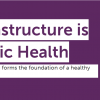

 Shared by Sandra Ware
on May 25, 2023
Shared by Sandra Ware
on May 25, 2023


 Shared by Sandra Ware
on Feb 7, 2023
Shared by Sandra Ware
on Feb 7, 2023

 Shared by Malcolm Guy
on Jul 19, 2022
Shared by Malcolm Guy
on Jul 19, 2022
 Shared by Karina George
on Jun 17, 2022
Shared by Karina George
on Jun 17, 2022
 Shared by Karina George
on Jun 17, 2022
Shared by Karina George
on Jun 17, 2022
 Shared by Karina George
on Jun 17, 2022
Shared by Karina George
on Jun 17, 2022
 Shared by Karina George
on Jun 17, 2022
Shared by Karina George
on Jun 17, 2022
 Shared by Karina George
on Jun 17, 2022
Shared by Karina George
on Jun 17, 2022
 Shared by Karina George
on Jun 17, 2022
Shared by Karina George
on Jun 17, 2022
 Shared by Karina George
on Jun 17, 2022
Shared by Karina George
on Jun 17, 2022
 Shared by Steve Lucas
on Aug 5, 2019
Shared by Steve Lucas
on Aug 5, 2019
 Shared by Housing Is
on Jun 13, 2019
Shared by Housing Is
on Jun 13, 2019
 Shared by Housing Is
on Jun 11, 2019
Shared by Housing Is
on Jun 11, 2019
 Shared by Housing Is
on May 30, 2019
Shared by Housing Is
on May 30, 2019
 Shared by Housing Is
on May 28, 2019
Shared by Housing Is
on May 28, 2019
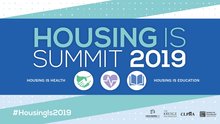
 Shared by Housing Is
on May 24, 2019
Shared by Housing Is
on May 24, 2019


 Shared by Housing Is
on May 24, 2019
Shared by Housing Is
on May 24, 2019
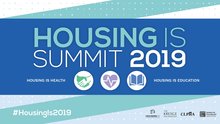
 Shared by Housing Is
on May 24, 2019
Shared by Housing Is
on May 24, 2019

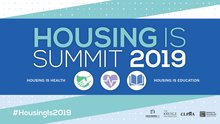
 Shared by Housing Is
on May 24, 2019
Shared by Housing Is
on May 24, 2019

 Shared by Housing Is
on May 23, 2019
Shared by Housing Is
on May 23, 2019

 Shared by Housing Is
on May 21, 2019
Shared by Housing Is
on May 21, 2019

 Shared by Housing Is
on May 21, 2019
Shared by Housing Is
on May 21, 2019
 Shared by Housing Is
on May 20, 2019
Shared by Housing Is
on May 20, 2019
 Shared by Housing Is
on May 13, 2019
Shared by Housing Is
on May 13, 2019

 Shared by Housing Is
on Apr 30, 2019
Shared by Housing Is
on Apr 30, 2019
